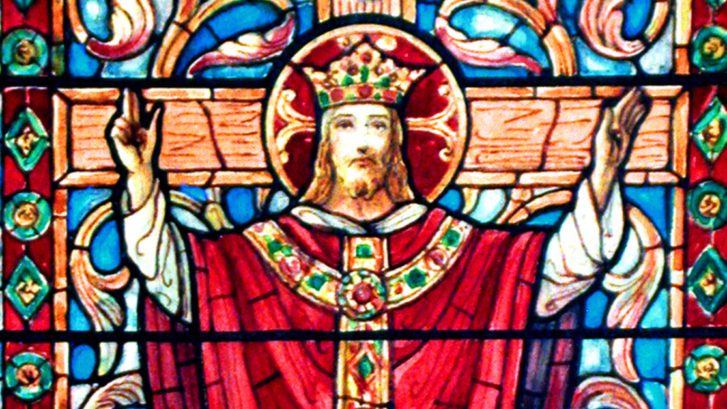In today’s Gospel, we have an ironic scene. The irony was lost on most of the bystanders: God himself was standing a prisoner before a representative of the superpower of the day. Indeed, we might have to remind ourselves that this Jesus who was born in straw, who worked as a carpenter and walked dusty roads preaching and healing, who was killed as a convict, this Jesus is king of the universe.
Yes, He was born in a stable but the prophet Isaiah announced, a child is born to us, but the scepter of a king is upon His shoulder. He worked as a carpenter, but Daniel would prophesy that God gave Him power and glory and a kingdom, and all peoples, tribes and tongues shall serve Him. Jesus taught and preached in a tiny corner of the world, and yet the psalmists foretold, He shall rule from sea to sea, and from the river unto the ends of the earth. He died the death of a convict, yet an angel told His mother of His kingdom, there shall be no end.
Jesus is king because He is what He is. Not a mere man, but the God man, God with us, God in human form. And Christ is king because He did what He did: He purchased us at a great price. As St. Peter tells us, you were redeemed not with perishable things, with silver or gold, but with the precious blood of Christ.
Millions will say Jesus is Lord and Christ is their king, but for some, they mean the modern concept of kingship called the Constitutional monarchy. The constitutional monarchy is a figurehead who reads the policy of the government in power, reads it without comment or opinion. Every public statement of the constitutional monarch must meet the prior approval of the elected government.
The constitutional monarch is a person who is head of state, one who puts the people in touch with their past, but has little baring on their daily lives. Too often we try to turn Jesus into one who does our bidding, one who reads to us only the messages that we have approved. It’s okay to do this or that, because Jesus will understand. Yes, He will understand, but will He approve?
Jesus has the right to command, and we have an obligation to obey. Yet Jesus is not like kings of old, He is not a tyrant. This king had pity on His subjects, and so He stepped down from Heaven and put on flesh. He walked, and worked and slept. He learned what hunger and thirst feel like. He was sold for silver, slapped and spat upon, whipped like a dog and nailed to a tree.
This king died that His subjects might live; those who love Him, as well as those who hate Him. This king welcomes you into His kingdom on earth at baptism. He knows that it is not by bread alone that you live and so He feeds you with His flesh, for otherwise, you shall not have life, at least not God life. This king unites Himself so intimately with you that He can say, I am the vine, you are the branches.
No, this king is not like the kings of the earth. You are His slave and He treats you like a friend. You were dust and He lifted you a little below the angels. You were homeless, and He gave you His church. Orphans, and He gave you His father and mother. Hungry, and He gave you His body. You were His enemy, and He died for you
And what does this king demand of us? What tax does He levy? What this king wants most is the only thing you can really refuse Him, the one thing he will never take from you unless you give it, and that is your love. Like any king, He does make demands on His subjects but He does not send legions of angels to see that you keep them. He merely says if anyone love Me, they will keep My word and My father will love them and We will come to them and make Our home with them. He demands that you make yourself one with those around you, that you show love and concern for all because all of them, whether they look like it or not, were redeemed by His blood. His royal command is love one another as I have loved you.
The church continues to proclaim that Jesus is king, and in spite of our attempt to make Him into a constitutional monarch, the Gospel shows us one who would rule our lives by suffering and through service. This is a king who asks that we look after the elderly and the sick. This is a king who asks that we stop and listen to the troubled and the alienated. This is a king who asks that if we are among those who need help, that we turn to Him and knock, and the door will be opened. Seek, and we will find. For He is a king who loves us with an everlasting love, a king who is full of mercy and compassion.
Jesus before Pilate discloses what is of ultimate importance. It is not the state nor the nation. It is not self. It is Christ the King who summons us to truth, to justice, to love, and sometimes to suffering on the cross. Pilate was in a dilemma, and so are we. At some point in our lives we have to make a decision: either to accept and worship this kingly God and all that entails, or like Pilate, to wash our hands of Him.


